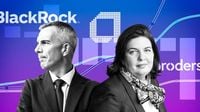In a rapidly evolving financial landscape, actively managed ETFs and semi-liquid alternatives are redefining the European fund sector, according to Broadridge’s 2025 Fund Brand 50 (FB50) report. The latest edition of this influential report highlights a significant shift away from traditional active mutual funds toward innovative structures that combine efficiency, accessibility, and investment strategy. As European selectors increasingly prioritize “appealing investment strategy” over their counterparts in the US and Asia Pacific, demand for active ETFs has surged, leading equity ETF providers to record their best performance to date.
BlackRock has maintained its position as the global leader for another year, but JPMorgan is rapidly closing the gap. The US bank has claimed the top spots in Germany and Italy, and has surpassed BlackRock in Sweden and Switzerland, indicating a notable regional shift in the asset management landscape. In France, however, BlackRock has slipped to fourth place, falling behind Natixis, Pictet, and Amundi. This growing rivalry between BlackRock and JPMorgan sets the stage for a potential leadership change in the European brand rankings by 2026, as suggested by the report.
Despite the top five brands remaining unchanged, the rest of the top 10 saw significant reshuffling, with passive specialists climbing the ranks and new entrants emerging. Active managers like Baillie Gifford and Artemis have gained ground despite facing various challenges. Conversely, Robeco and Nordea, both known for their strong ESG credentials, have experienced declines in brand perception as interest in ESG investing wanes. This downturn has been attributed to a rise in “greenhushing,” where asset managers are dialing back their sustainability messaging due to fears of political backlash and legal scrutiny.
The year 2024 was marked by geopolitical turbulence, fee compression, and resource cuts, compelling firms to rethink their operating models. The report indicates that many of the best-performing brands in the FB50 were those that diversified into fast-growing areas like active ETFs and semi-liquid alternatives. These newer segments not only offer higher profit margins but also align with investor demand for innovative structures capable of delivering returns in a low-growth, high-volatility environment.
Selectors have placed increased importance on brand attributes tied to clarity and capability. The report notes that “expert in what they do” has risen to second place in Europe, surpassing “client-oriented thinking.” Attributes such as “keeping best informed” and “solidity” round out the top five. As selectors navigate an increasingly complex array of product choices and market conditions, firms that offer transparent, well-communicated strategies with proven expertise are being rewarded.
Communications have emerged as a crucial factor in brand strength, with asset managers recognized for their strategic, state-of-the-art communications outperforming others even in challenging markets. For instance, Pimco fell to 12th globally but remains highly respected for its investor communications, despite bond ETFs gaining favor over traditional fixed-income funds.
In terms of product trends, active ETFs have emerged as the clear winners in Europe, with record inflows reported throughout 2024. Managers who previously focused solely on mutual funds are now launching active ETF equivalents to meet this surging demand. Alternatives have also gained traction, with a notable increase in the launch of semi-liquid strategies designed to provide institutional-like access to private markets for retail and high-net-worth investors.
While having a distinct product range remains essential, Broadridge cautions that it is becoming more of a hygiene factor than a differentiator. “Today’s fund selector expects intuitive client service, highly effective and strategic communications, and thorough expertise in newer and more complex product segments,” the report states. Interestingly, selectors in EMEA (Europe, the Middle East, and Africa) place a lower premium on “solidity” compared to their counterparts in APAC (Asia-Pacific) and the US.
Barbara Wall, director of EMEA insights at Broadridge, commented on the findings, stating, “An unchanged trio of US fund providers top the brand ranking. JP Morgan closed the gap further in 2024 on first-ranked BlackRock, as both groups score highly across all 10 brand attributes, except ‘Social responsibility/sustainability’. European groups are still well-represented at the top table, making up five of the top 10, with DWS breaking into the top 10 for the first time.”
The report highlights how active ETFs are not just a lifeline for Europe’s struggling asset managers but also a testament to the evolving preferences of investors who are increasingly looking for innovative and effective investment solutions. As the landscape continues to change, those firms that adapt and embrace these new structures are likely to thrive in the competitive market.

